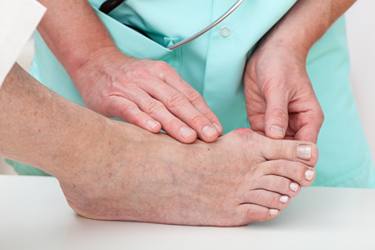
A bunion is considered to be a deformity that can happen for genetic reasons, or from wearing shoes that are too tight. A bunion is a bony growth which forms on the side of the big toe. Severely protruding bunions may cause the other toes to shift toward each other as well, and larger shoes may need to be worn. Some people have corns and calluses that grow on top of the toes, as a result of the friction that is caused when they touch the top of the shoe. Wearing high heels may cause a bunion to form from the limited amount of room the toes have to move in. Relief may be found with mild bunions when a protective pad is worn over them. Some patients have chosen to wear custom-made orthotics, which may help the foot to feel more comfortable in the shoe. If you have a bunion, it is suggested that you consult with a podiatrist who can guide you toward the treatment option that is best for you.
If you are suffering from bunion pain, contact one of our podiatrists of Lakeside Foot and Ankle Center. Our practitioners can provide the care you need to keep you pain-free and on your feet.
What Is a Bunion?
Bunions are painful bony bumps that usually develop on the inside of the foot at the joint of the big toe. As the deformity increases over time, it may become painful to walk and wear shoes. Women are more likely to exacerbate existing bunions since they often wear tight, narrow shoes that shift their toes together. Bunion pain can be relieved by wearing wider shoes with enough room for the toes.
Causes
- Genetics – some people inherit feet that are more prone to bunion development
- Inflammatory Conditions - rheumatoid arthritis and polio may cause bunion development
Symptoms
- Redness and inflammation
- Pain and tenderness
- Callus or corns on the bump
- Restricted motion in the big toe
In order to diagnose your bunion, your podiatrist may ask about your medical history, symptoms, and general health. Your doctor might also order an x-ray to take a closer look at your feet. Nonsurgical treatment options include orthotics, padding, icing, changes in footwear, and medication. If nonsurgical treatments don’t alleviate your bunion pain, surgery may be necessary.
If you have any questions, please feel free to contact our offices located in Leesburg and The Villages, FL . We offer the newest diagnostic and treatment technologies for all your foot care needs.
